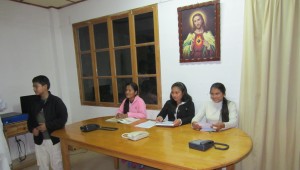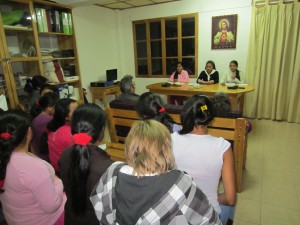 Oxapampa sounds like a made up place, but it is in fact a beautiful jungle oasis in the centre of Peru. It is quite an unexpected sight after driving for hours through mining towns across the central mountain range of the Andes, where mining companies have raped the land and contaminated the towns.
Oxapampa sounds like a made up place, but it is in fact a beautiful jungle oasis in the centre of Peru. It is quite an unexpected sight after driving for hours through mining towns across the central mountain range of the Andes, where mining companies have raped the land and contaminated the towns.
We had a rather unexpected treat at the 4818m pass at Ticlio – a hail storm!
Together with 3 other teachers, we were on our way to visit the PROSOYO girl’s refuge home in the small village of Quilazu, just outside Oxampampa. Markham college had recently been with a group of students to assist in the construction of a new building. This visit was to prepare for the next visit in the upcoming vacation where the students would be involved in helping prepare ground for a new sports area. A small delegation of staff and students from 2 other Round Square schools: Anglo Colombiano School in Bogota and St Andrews in Florida were also going to be joining. The relationship with Markham is fairly new and Adrian, the project organizer, was keen for me to see it and know my views.
Once over the Ticlio pass the scenery begins to change, hinting at the jungle ahead.Arriving in Oxapampa after 11 hours of driving, was somewhat of a confusing visual experience! It was like nothing I had ever seen in Peru before with its mixture of German, Austrian and Peruvian influences in the architecture. I also found some surprises in one of the shops – fancy finding these in Oxapampa!
I had not heard of Prosoyo before (PRograma SOcial YAnachaga) so imagine my complete surprise when I found out the project was originated in Bielefeld where my husband & I first met!! In 1988, a group of 20 students, friends and teachers from Bielefeld and Bethel traveled to Huancabamba to renovate an old run-down establishment, Yanachaga, with the aim of developing a social service project with an ecological focus. Yanachaga was first built by the Boettger Family who emigrated to Peru in 1875, along with many other Germans and Austrians at the time. On the group’s return to Bielefeld, the organization “Peru-Aktion” was founded.
The group were fortunate to have a like-minded friend: Hugo Fernandez, a Peruvian university professor of education who was interested in the project. He was paid a small salary by Peru-Aktion in order to develop the project further.
The Huancabamba, fertile pastoral land is scarce with few fields on the banks of the Chorrobamba river. Many people walked long distances to farm fields in the mountains. Peru-Aktion gave a group of 25 farming families land to farm on the condition they follow certain guidelines:
- No burning off
- Avoid chemical pesticides
- Do not plant the much loved Rocoto pepper plant that leaves the soil useless
- Plant plants for food for their families such as corn, bananas and yucca
- Plant young trees in the unused gaps between fields to try and rebuild burnt and damaged areas.
In addition to this project, Peru-Aktion also began an experiment taking 6 young boys from one of the poorest parts of Lima to Huancabamba with the aim of educating them in practical work in nature. The aim being to attend school in the mornings and learn useful trade skills in the afternoon.
However this was the beginning of very troubling times in the area when in the early 1990s, the Shining Path terrorist group spread to the area, with fatal consequences. (The group were fighting for the rights of indigenous farmers, but the reality was many of these very people suffered at their hands, or the military fighting the terrorists. Many fled the area. Hugo Fernandez managed to survive on the farm with the boys, despite being a target for both the terrorists and the military who accused him of training terrorists.
Yanachaga continued to develop and began taking orphaned boys or boys from very poor families from the surrounding area. They learnt useful skills in the workshops which with the help of Peru-Aktion in Germany they became well outfitted with a bakery, metal workshop, carpentry workshop, small farm with farm animals, coffee production and vegetable garden. They also have undertaken an extensive reforestation program on the hill by the centre and have a restaurant and eco-lodge which provides some income. The boys are also involved in community work and have helped to build facilities for the local school, including a sports hall. Some of the boys have returned here to work as teachers in the workshops. All boys who have left the home are now gainfully employed and doing very well and several are now leaders in their community. One of the big focuses of Prosoya is to encourage the boys to work in their own rural environment and not head off to the cities for a “better life”. Here are some pictures of my visit there.
The Prosoyo Quillazu girls’ project is quite new and has a long way to go to being as established as the boys’, but everything is moving in the right direction. The girls come from very difficult backgrounds; either abandoned or considered at risk. Many have been the victims of domestic violence. The carers are wonderful people and are definitely the ones responsible for the calm and kind atmosphere of the house. The main carer gave me an insight into how the girls came to be here and their backgrounds. Some stories were pretty horrific and made me wonder how these girls ever get over what they have been through.
The girls attend a school that is literally next to their home and in the afternoons they learn handicraft skills, work in their gardens, receive lessons on hygiene, nutrition and also extra English lessons from the volunteer gap students from Germany. Here are some pictures from my visit.
I guess for the hardest thing for me to rationalize was did Prosoyo need Markham’s involvement? Looking at the amazing establishment of Yanachaga and its workshops, one would think not. The infrastructure based on the ongoing support in Germany has and still is proving to be a success. So why were we here, so many hours from the city where poverty abounds?
One evening sitting with the girls and listening to their “news” presentation was enough to convince me this was a worthwhile relationship worth building on, where lasting impressions could filter through to life changing encounters.
Service work cannot be one way. One cannot ignore the huge impacting value of having privileged students interacting with fellow students of their own age from a totally different socio economic background and circumstances. These beautiful girls whose traumas lay well hidden between their calm and beautiful smiling faces had lessons to teach us all on coping with life and taking control.
Links
Click HERE for videos in either German or Spanish on the Prosoyo projects.


